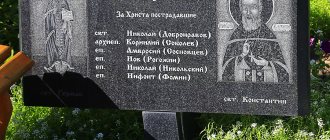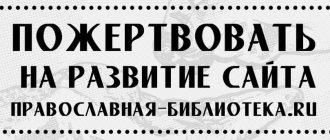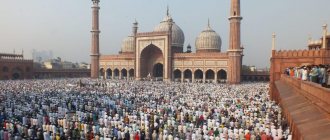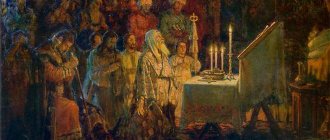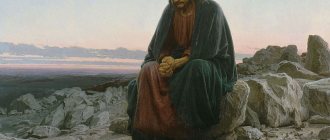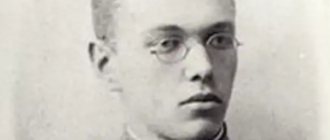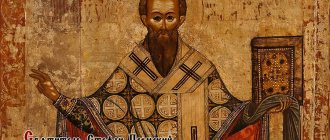After the baptism of Kievan Rus, the influence of Byzantium on the Eastern Slavic tribes increased sharply. Our ancestors became one of the most loyal subjects of the ruler of Constantinople. This is primarily due to significant economic assistance from the ancient and powerful state.
But no one has canceled the factor of religion either. Seeing the magnificent temples built by Byzantine masters, ordinary people were filled with sacred awe and willingly paid the required tithe. The most ardent believers aspired to become priests or monks. Why did they completely abandon worldly life and devote themselves to serving the Lord God.
Icon of Nikita of Novgorod, 6th Bishop of Veliky Novgorod. The image was painted in the 17th century. During the reign of the saint, several large churches were rebuilt in Novgorod. Photo: upload.wikimedia.org
Nikita of Novgorod took monastic vows at a young age and devoted his entire life to serving Christ. Almost immediately after being tonsured, the monk went into seclusion and overcame the temptation of the Devil. For the rest of his life, he remembered his experience and ardently sought to protect honest Christians from the Tempter. Towards the end of his life, Nikita accepted the rank of bishop of the Novgorod land. In the north, he preached the Word of God, for which in the sixteenth century he was elevated to the rank of saint in the rank of Saint. Another name of the saint is Nikita Pechersky.
Nikita Novgorodsky overcomes life's challenges
There is no exact information about the worldly life of the saint and it is unlikely to become known. Everything happened too long ago. It is known for certain that Nikita was born on May 25, 1030 in Kievan Rus in the city of Kyiv. In the life of Nikita of Novgorod it is written that from an early age the boy participated in church life and as soon as his age allowed him, he immediately became a monk. His home was the Kiev-Pechersk Lavra, where he spent his first years in the bosom of the church.
The first monastery in Rus' - Kiev-Pechersk Lavra
Nikita Novgorodsky is tempted by a demon
Almost immediately after starting his life in the Kiev-Pechersk Monastery, Nikita expressed a desire to go into seclusion. The then rector of the monastery, Abbot Nikon, tried in every possible way to dissuade the young man from such an act. However, Nikita insisted on his own and, contrary to the good will of the abbot, went into seclusion. The Devil took advantage of the monk’s youth and inexperience and began to tempt the boy in every possible way. In the patericon of the monastery there remains a quotation concerning the events of that incident.
Excerpt from the patericon of the Kiev-Pechersk Monastery:
...and the devil deceived him. ...a demon stood before him in the form of an angel. The monk fell on his face and bowed to him as if he were an angel. And the demon said to him: “Don’t pray, just read books, and in this way you will talk with God, and from books you will begin to give useful words to those who come to you. I will constantly pray to my Creator for your salvation.” Having been seduced, the monk stopped praying, and diligently occupied himself with reading and book wisdom; seeing the demon constantly praying for him, he rejoiced at him, like an angel praying for him.
Nikita could not stand it and succumbed to temptation. He began to read all the books of the monastery and memorized the Old Testament. However, he never opened the Gospels or said prayers. Very quickly he began to prophesy and a stream of pilgrims flocked to the saint. The monastic brothers of the monastery quickly suspected something was wrong and cast out the demon. After this, Nikita stopped understanding reading and writing and had to relearn the alphabet. In addition, the saint began to observe his vows even more strongly and prayed regularly, thereby restoring his good name.
Brief life of Saint Nikita, recluse of Pechersk
Saint Nikita was born in the 11th century. He began monastic life in the Kiev Pechersk Lavra. Being very young and burning with zeal, but not yet possessing the gift of spiritual reasoning, he shut himself up in a cave against the will of the abbot, the Monk Nikon. The elders, who had experience in spiritual warfare, soon realized that the novice was mistaken, and fervently prayed for him. Soon the hermit’s cave was filled with an extraordinary fragrance. He heard a voice and, thinking that he had received Divine revelation, exclaimed: “Lord, appear to me tangibly so that I can see You!” The mysterious voice answered him: “I am sending an angel to you, and you do everything he tells you.” Then a demon appeared under the guise of an angel of God. The foolish novice, without hesitation, fell to the ground and bowed to him. The demon ordered him to stop praying, saying that from now on he himself would pray to the Lord for him, and ordered him to devote all his time only to reading the Old Testament. The unfortunate man mindlessly obeyed. He abandoned prayer and, consoled by the constant presence of the angel, began to memorize the Old Testament.
After some time, the demon began to reveal to Nikita the events taking place in the world, so that it seemed as if the recluse had received the gift of prophecy. An increasing number of lay people began to come to him to hear predictions. However, the elders noticed that Nikita never told his visitors anything about the New Testament. Realizing that he was in demonic delusion, they decided to intervene to lead him out of his delusion. The monks broke down the door of his cave, drove out the false angel with their prayers and forced the recluse to go outside.
Nikita was saved from obsession, but it seemed that he had fallen into childhood. He suddenly not only forgot the entire Old Testament, but even forgot how to read, so he again had to study like a schoolboy. So, gradually coming to his senses, he realized what his mistake was, sincerely repented, shedding copious tears, and began to live in complete obedience and humility. He grew in holy virtues, so that he was subsequently awarded the rank of Bishop of Novgorod the Great. And after his blessed death in 1108, Saint Nikita continued to perform numerous miracles, especially healing the blind.
Nikita is sent to Novgorod
Many years have passed since the incident of temptation. Nikita showed his best side and won everyone's respect. For this reason, in 1096, Metropolitan Ephraim of Kiev elevated the saint to the rank of bishop. After which he was appointed head of the Novgorod diocese. In the historical chronicle “Painting, or a brief chronicler of the Novgorod Lords,” it is mentioned that Nikita became the sixth bishop of Veliky Novgorod. The saint showed an unusually active position and during his service, many churches were built in the principality. These include the Transfiguration Church and the Church of the Nativity of the Blessed Virgin Mary, made entirely of wood. The miracles that the ruler performed were recorded. In particular, he stopped the fire with a wave of his hand and with a word made the heavy rain stop.
St. Sophia Cathedral in the city of Veliky Novgorod. Saint Nikita of Novgorod served here during his lifetime. After death, the remains of the saint were placed in the temple crypt. Photo: upload.wikimedia.org
Death overtook Saint Nikita in 1108. The saint was buried in the St. Sophia Church in the city of Novgorod. His remains were considered lost until the 16th century.
The complete life of Saint Nikita, the recluse of Pechersk
Reverend Nikita, a native of Kiev, was one of the first tonsures of the Kiev-Pechersk monastery. He labored there under the Venerable Abbot Nikon (1078–1088). In his youth, the monk Nikita, wanting to become famous among the monks, began to ask the abbot to bless him to strive alone, in seclusion. The abbot prevented him, saying: “Child! It is not good for you to sit idle when you are young. It is better for you to be with your brethren, working together, and you will not lose your reward. You yourself saw our brother Isaac the cave dweller, how he was seduced by demons in seclusion; and only the grace of God and the prayers of our venerable fathers Anthony and Theodosius saved him. Your desire is beyond your strength.” Nikita did not want to listen to the abbot’s words at all, since he could not overcome his strong zeal for a reclusive life, and therefore he did what he wanted. And he, having closed himself, blocked the door tightly and, without leaving, remained alone in prayer. Few days passed until the monk escaped the snares of the devil. While he was singing, he heard a certain voice, as if someone was praying with him. At the same time, Nikita smelled an indescribable fragrance. Then a demon appeared before him in the form of an Angel. And the inexperienced ascetic, seduced, bowed to him as an Angel. Then the demon said to him: “From now on, don’t pray anymore, but read books and you will talk with God and give useful words to those who come to you. I will always pray to the Creator for your salvation.” Nikita, believing what was said and being even more deceived, stopped praying, but began to read books more diligently, seeing the demon constantly praying for him. Nikita rejoiced, thinking that the Angel himself was praying for him.
Soon Nikita became so improved in the study of the Old Testament that he knew it by heart. He also talked a lot with those who came to him from the Scriptures about the benefits for the soul. At the inspiration of the tempter, he began to prophesy, and great fame spread about him, everyone marveled at the fulfillment of his prophetic words. So, Nikita informed Prince Izyaslav about the murder of Novgorod Prince Gleb Svyatoslavich. Indeed, news soon arrived that confirmed his words. The chronicles report that Prince Gleb was killed on May 30, 1079. So Nikita’s prophecies were fulfilled with amazing accuracy. This convinced the recluse that his chosen path was correct. Nikita did not think about prayer and repentance.
He often talked about the Holy Scriptures of the Old Testament, but avoided even mentioning the name of the Lord Jesus Christ, avoided talking about the Holy Gospel. Having learned about this, the holy fathers of the Kiev Pechersk Lavra realized that the monk was in a dangerous state of spiritual delusion. They did not leave their brother in trouble. The reverend fathers, having made many prayers for Nikita, cast out the demon from him. After this they asked Nikita; whether he knows anything from the books of the Old Testament. Nikita swore that he had never read them and even found himself forgetting to read and write, so his fathers taught him to read and write again. Then, having come to his senses, Nikita “confessed his sin and wept bitterly about it, giving himself great abstinence and obedience, let us adopt a pure and humble life, so that he would surpass everyone in virtue.” The humane Lord, seeing such great feats of the blessed one, as well as his previous virtues, accepted his true repentance. And just as Christ said to Peter, who denied three times, after his repentance: “Feed My sheep,” so the Lord showed His mercy to Nikita, who sincerely repented, for he then elevated him to the bishop of Novgorod.
In 1096, the Monk Nikita was elevated to the rank of bishop by Metropolitan Ephraim of Kyiv (second half of the 11th century) and appointed to the see of Veliky Novgorod. In the “Mural, or short chronicler of the Novgorod rulers,” Saint Nikita is listed as the sixth Bishop of Novgorod.
Since the time of his episcopal consecration, the works of Saint Nikita have multiplied, and the exploits that he performed in the monastery have increased. “He received the flock and decorated himself with various kindnesses, having in himself the root of silence, the branch of abstinence, the flower of fasting, the fruit of humility, adorned with love, perfected by alms, purity, and chastity, and righteousness from both sides, like walls, fenced off by all abounds in good morals.” The subject of special concern of Saint Nikita was missionary activity to establish Christianity, spread and maintain piety in the diocese. During his twenty years of episcopal service, he was an example of a virtuous life for his flock. The Eulogy to Saint Nikita says that he secretly gave alms to the poor, fulfilling the word of God: When you give alms, do not let your left hand know what your right hand is doing, so that your alms may be in secret (Matthew 6:3-4).
Saint Nikita was a zealous man of prayer and intercessor for his flock, and the Lord glorified his virtuous life by giving him the gift of working miracles. The chronicles have preserved evidence of two cases of miraculous salvation of Novgorod from disasters: in 1097, Saint Nikita with his prayer extinguished a fire that was destroying the city, and another time, during a disastrous drought, he brought down rain. Obviously, this is why he is revered by believers as a protector from fires and the patron of agriculture. It is also known that Saint Nikita was revered as a defender of the fatherland and patron of warriors. The chronicler, talking about the campaign of the Novgorod prince Mstislav and his victories, notes that Mstislav returned “to his city through the prayers of the Monk Nikita, Bishop of Novgorod.”
The Novgorod saints were the first to show their activity in various public endeavors: they built and decorated churches with the help of the best craftsmen who were invited from Byzantium and Western Europe. The most significant literary works of Novgorod were created mainly at the ruler's court. Thanks to the labors of Saint Nikita, several churches were built in Novgorod that have not survived to this day, information about which is available in chronicles and ancient lives: the Transfiguration Church on Ilyin Street (rebuilt in 1574), the Annunciation Church on the Settlement (rebuilt in 1342 ), wooden Church of the Nativity of the Blessed Virgin Mary in the Anthony Monastery.
Anthony's Monastery - the second in Novgorod - was founded with the blessing of St. Nikita by the Monk Anthony the Roman (†1147; commemorated January 17/30, August 3/16, also on the first Friday after the day of remembrance of the apostles Peter and Paul) at the beginning of the 12th century. With the assistance of Saint Nikita, the Monk Anthony received territory for the monastery on the banks of the Volkhov River, where the stone on which Anthony miraculously sailed from Rome stopped. Shortly before his death, Saint Nikita, together with the Monk Anthony, marked out the site for a new stone monastery church, which he blessed to consecrate in the same way as the previous (wooden) one - in honor of the Nativity of the Most Holy Theotokos. Saint Nikita with his own hands began to dig a ditch for its foundation. But the temple was built already under his successor, Bishop John (1108–1130).
Saint Nikita ruled the Novgorod flock for 13 years and died peacefully in 1109, on January 31.
After the death of Saint Nikita, painting of the walls of the Novgorod Cathedral in the name of St. Sophia the Wisdom of God began, according to the will of Saint Nikita.
To this day, the stone building of the Novgorod bishop's house is intact, both in monuments and in folk tradition, known under the name Nikitinsky. This is the oldest building of the bishop's building that has survived to our time and was rebuilt to the middle vaults.
Despite his numerous labors and concerns for the improvement of the Novgorod diocese, Saint Nikita never abandoned the special feat of the hermit monks: under his saintly robes he wore heavy iron chains. The saint was buried in the Novgorod St. Sophia Cathedral, in the chapel in the name of Saints Joachim and Anna - the parents of the Most Holy Theotokos.
In 1547, under Archbishop Feodosius of Novgorod (1542–1551), a certain pious Christian, on Easter night during a divine service, received a revelation command to decorate the tomb of St. Nikita with a cover, which was carried out. In the same year, at a church council, the all-Russian glorification of the saint took place. A few years later, Archbishop Pimen of Novgorod (1553–1570) opened the tomb with the blessing of Metropolitan Macarius of Moscow († 1563). The discovery of the incorruptible relics of St. Nikita took place on April 30, 1558. It is noteworthy that, through the gracious help of the saint, it is mainly those with eyes and the blind who receive healing.
The relics of the saint were transferred in 1629 from a dilapidated tomb to a new, wooden one, lined with basma silver. Since the Joachim chapel was small, with the blessing of Archbishop Pimen of Novgorod, a semicircular extension was built on the eastern side of the chapel, connected by an arch to the Nativity chapel. Under this arch the relics of the saint were placed in the tomb. The Novgorodians brought a lamp with a gilded inscription as a gift to their heavenly patron: “The candle of Veliky Novgorod, of all Orthodox Christians, was placed on the new Novgorod miracle worker Nikita in the summer of 7066, April 30, under Archbishop Pimen.” This “candle” of St. Nikita, together with the ancient tomb, vestments, staff and chains, were later kept in the sacristy of the Novgorod St. Sophia Cathedral.
Currently, the tomb of St. Nikita is located in the church in the name of St. Apostle Philip, where it resides in the northern aisle in the name of St. Nicholas.
Saint Nikita is canonized
For a very long time after the death of Nikita Pechersky, they did not remember him. Unless they prayed for his soul in his native church. In 1547, the saint was remembered and elevated to the rank of Saint. After which the days of Remembrance were established. Nikita of Novgorod is revered only within the Russian Orthodox Church. Another miracle happened in 1558. The relics of Saint Nikita of Pechersk were discovered again. They were declared incorruptible. Along with the saint they found the bishop's full robe.
Mention of the relics of Nikita of Pechersk in “Antiquities...” by F. Solntsev:
At the opening of St. of his relics in 1550, a vestment was found on him, preserved incorrupt in the grave, where it lay for 450 years. The entire vestment consists of a phelonion, an epitrachelion, a bridle, a club, a brown damask belt, an omophorion made of white lustrine, and a blue grodetour cap (made of thick taffeta) trimmed with ermine fur; crosses and seraphim with the words Straphim are embroidered on it in gold. This cap served as a miter. To this episcopal utensil of the 11th century. belongs to the bishop's staff, which will be discussed below, and iron chains weighing 20 pounds, found on the relics of the Hierarch. On the day of the discovery of his incorruptible remains, the Novgorodians brought to his tomb an iron lamp, stored in the sacristy, with a circular incised inscription: “The Saint of Veliky Novgorod for all Orthodox Christians, placed before the new wonderworker Nikita in the summer of April in the day, under Archbishop Pimen."
Elements of the bishop's attire found together with the relics of St. Nikita of Pechersk.
The items were well preserved due to the climatic conditions of the crypt. Photo: upload.wikimedia.org During Soviet rule, the relics of St. Nikita were transferred several times. In 1956, Bishop Sergius moved the remains of the saint to St. Nicholas Cathedral. In 1962, the relics were disturbed again. This time they were sent to the temple of the Apostle Philip. In 1993, the remains of the saint were returned to the St. Sophia Cathedral in Novgorod.
Days of memory of St. Nikita of Pechersk:
- January 31 (February 13);
- April 30 (May 13);
- May 14 (May 27).
Holy face
Turning to the icon of St. Nikita of Novgorod also helps in finding a decent job, as well as obtaining an excellent education. Placing it in the house will help protect it from thieves, fire, and natural disasters. And for residents it will protect against deception and misconception. There is an opinion that reading a prayer from this image will have greater power. Here is her text.
Brothers and sisters in Christ. We run our own community on VKontakte https://vk.com/molitvuikonu called Prayers for Every Day, where we try to post Orthodox prayers and news. If you have your own VK page, subscribe to us.
Oh, the bishop of God, Saint Nikito! Hear us sinners, who today flock to this sacred temple, and worship your honorable image, and fall to your sacred race, and cry out with emotion: as if sitting on the throne of the sanctity in this Great Novegrad, and the only lack of rain, you brought down the rain with prayer, and again I will engulf this city with a fiery flame, you have given me a prayer to deliver, so now we pray to you, O Saint Nikito of Christ: pray to the Lord to deliver the reigning city, this Great Novgrad and all Christian cities and countries from cowardice, flood, famine, fire, hail , sword and from all enemies visible to invisible, for we are saved by so many for the sake of your prayers, we glorify the Most Holy Trinity, the Father and the Son and the Holy Spirit, and your merciful intercession, now and ever, and unto the ages of ages. Amen.
If this also happens on Memorial Day, the effectiveness will increase several times. In Christianity, the feast day of the holy recluse falls on February 13, May 13 and May 27.
